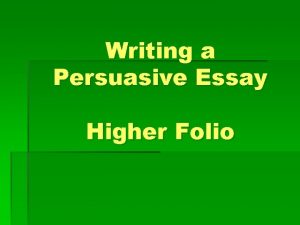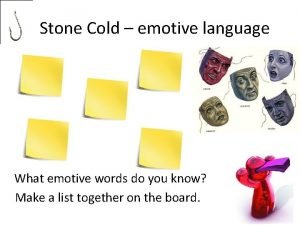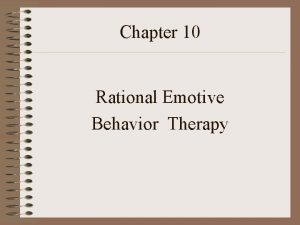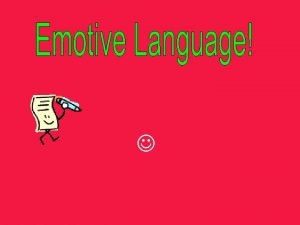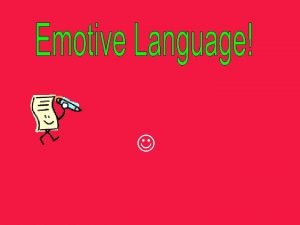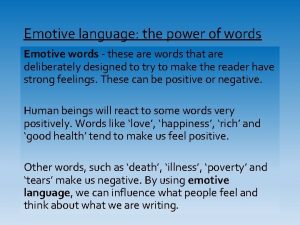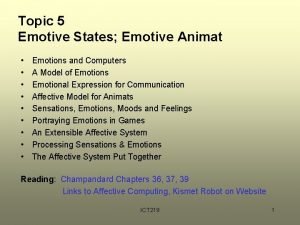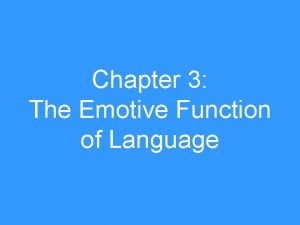What is emotive language Emotive language is the









- Slides: 9


What is emotive language ? Emotive language is the deliberate use of strong words to play on the reader’s feelings. Such words can be used to evoke strong emotional responses in order to pressure, even coerce, readers to agree.

disgus ti ng vic io u r a l u c a t s c e p s t n e v r fe vile Are all examples of emotive words! exorbi tant g n i y f i r r o h m o l l e v ar exhilarating k a e r b t r ea h g n i

How does it persuade? When writers and speakers use stronger words than normal to draw attention to an issue, they bring into play an element of exaggeration. A helpful strategy to understand the full impact of very strong words is to substitute strongly emotive words with other words, then to look at how that changes the impact of the language. For example, “Swearing is a vile habit” changes if we say “Swearing is a bad habit”. The former argument is clearly more powerful, it draws the message across and is more emotional than the second statement that is critical yet does not express overtones of disgust.

Words/phrases in this article such as; • “Lead-footed hoonettes” • “Female petrolheads” • “Illegal drag meets” • “Flouting the law” • “Major issue” • “Slammed into a power-pole” • “Highway pursuits” • “Laud their behaviour” • “Alarming trends” • “Busted weekly” In (tone adjective) news article published in The Herald Sun Peter Rolfe argues that there is a growing number of women who are becoming speeding drivers. Rolfe evokes a feeling of alarm in the reader using the emotive language ‘petrolheads’ and ‘lipstick leadfoots’ to describe the drivers. By incorporating exaggerated language it persuades the reader to feel negatively about female (hoon) drivers. Source; Herald Sun

Words/phrases in this article such as; • “Miserly $108” • “Desperately short” • “Giant price hikes” • “Shocking neglect” • “Labor failed” • “A mere $55” • “Rejected the claim” • “Overhaul” • “Bills are likely to soar” Source; Herald Sun In a passionate and outraged news article published in The Herald Sun, Stephen Mc. Mahon emphasises the lack of government funding for Victoria’s water supply and its inevitable impact on household water bills. By highlighting the ‘shocking neglect’ of the government and stating that bills are likely to ‘soar’, Mc. Mahon generates a feeling of anger towards the government and concern about poor water infrastructure.

Words/phrases in this article such as; • “Notorious criminal” • “Enjoying free rein” • “Special powers” • “Life of violent crime” • “Victims” • “Crime advocate” • “Money before morality” • “Thug for life” Positions the audience to agree with the writer, and persuade the reader to feel disgusted at this man. Also to be disappointed with the government for not doing something about it/him. Source; Herald Sun

Change the following sentence using…. emotive language. The dog ate the human head off the body. The dog MAULED the human head right off the INNOCENT body.

Thank you for watching. Any questions ? ? ? ?
